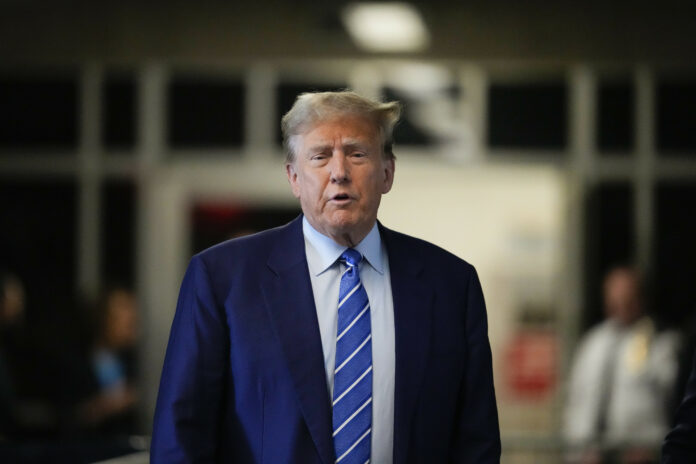More Americans believe abortion restrictions should be decided by the states rather than the federal government, according to polling conducted exclusively for Newsweek.
The results suggest more Americans are coming to share former President Donald Trump’s view on the issue. Trump, the presumptive Republican nominee, announced last week that he believes abortion limits should be left to the states, declining to endorse a national ban after months of speculation and warning that extreme stances on the issue could lead to Republican losses in November’s election.
Abortion has been a winning issue for Democrats, and President Joe Biden and his allies are campaigning on restoring abortion rights and seeking to draw a contrast with Trump. In a statement after Trump’s announcement, Biden said the former president is responsible for “creating the cruelty and the chaos that has enveloped America” since the Supreme Court overturned Roe v. Wade in 2022 and said that Trump would sign a national abortion ban if he wins back the White House.
Since the high court’s decision ended the nationwide right to abortion, most Republican-controlled states have new abortion restrictions in effect, including 14 that ban it at every stage of pregnancy. And last week, the Arizona Supreme Court ruled to uphold the state’s 1864 law that bans nearly all abortions, meaning Arizona now has the strictest abortion law of the top battleground states.
A poll, conducted by Redfield & Wilton Strategies after Trump’s announcement and the Arizona ruling, suggests that some Americans have shifted towards backing states’ rights on the issue of abortion in recent months.
Mary Altaffer/Pool-Getty Images
The poll, which surveyed 1,500 eligible voters about major election issues on April 11, found 41 percent of Americans believe individual state governments should determine laws surrounding abortion, while 39 percent said it should be the federal government. Twenty percent said they didn’t know.
Polling conducted for Newsweek in March, before Trump’s announcement, had more favoring the federal government determining abortion limits—42 percent—while 36 percent said it should be down to state governments. And voters were split, 40 percent and 40 percent, when the same question was asked in Newsweek‘s February poll.
The shift is most noticeable among Trump voters—57 percent said state governments should decide abortion limits in April’s poll, up from 51 percent in March and 52 percent in February. The views of Biden voters have stayed fairly constant, with 55 percent saying the federal government should decide abortion limits in April, down slightly from 58 percent in March but up from 53 percent in February.
Although the polling doesn’t indicate a huge shift in views, the shift could be a case of some voters taking their cues from Trump and other political elites.
“Many Americans have loose or malleable views on policy issues, even controversial ones like abortion,” Thomas Gift, an associate professor of political science and director of the Centre on U.S. Politics at University College London, told Newsweek. “Consequently, they often look to party leaders to inform their perspective.”
This phenomenon, Gift said, has been “a recurring theme with Trump, where a sizable portion of the GOP electorate has shifted its opinions on everything from Russia to the importance of the rule of law. It’s not surprising to see this extend to abortion, especially when it concerns matters of federalism and the balance of power between the states and Washington.”
However, Costas Panagopoulos, a political science professor at Northeastern University, cautioned that polling estimates “can frequently appear to bounce around somewhat even if real change is elusive.”
“Elite cues can influence supporters to shift their policy positions closer to their preferences, but, in this case, I would caution that the changes in the estimates reported over these few months are relatively modest and somewhat inconsistent,” Panagopoulos told Newsweek.
“Differences in views among subgroups over voters can also appear bigger, but there is also more error associated with these smaller, groups of respondents. Overall, I would take the apparent changes in these estimates with a grain of salt, for now, and continue to monitor preferences in the months ahead to determine if reliable and enduring changes in views have materialized.”
Uncommon Knowledge
Newsweek is committed to challenging conventional wisdom and finding connections in the search for common ground.
Newsweek is committed to challenging conventional wisdom and finding connections in the search for common ground.


